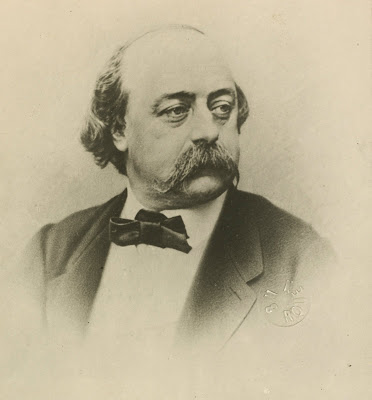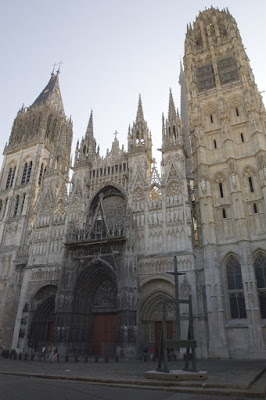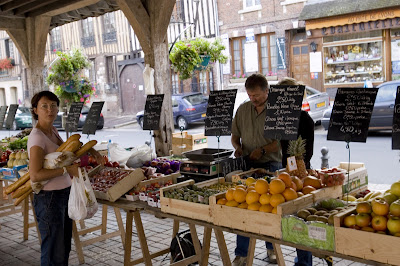Book Review: A Journey into Flaubert's Normandy
Gustave Flaubert is considered one of the greatest Western writers (who among us hasn't read Madame Bovary?), due to his love of - and search for - finding the right words to express himself. I recently read an incredible book about Flaubert - and, importantly - about Normandy and his sense of place and home.
The book? A Journey into Flaubert's Normandy, by Susannah Patton. The book is filled with incredible photos and paintings of Flaubert and his contemporaries, the buildings and landscape around Normandy, and his family home in Croisset. You can definitely plan an extraordinary literary travel tour based on this treasure of a book - but you may also be an armchair traveler, delving into Flaubert and France at will. Our copy is dog-eared from use - our 6-year old daughter peruses it for photos of France, ideas for her painting, and history lessons.

Flaubert par Nadar portrait of Flaubert: credit: Bibliotheque Municipale de Rouen
The author, Susannah Patton, grew up in San Francisco, but her interest in things French began early with school classes and a high school summer in France. She spent her junior year in Paris while majoring in French literature at Carleton College and then went back to Paris to live for three years. During this time she studied political science at the Insitut d’Etudes Politiques and got her start in journalism at the International Herald Tribune. Later, after earning a graduate degree in journalism from Columbia University, she returned to Paris as a reporter for Dow Jones and then the Associated Press. While in Paris, she also wrote stories for Time Magazine, the Dallas Morning News and the Baltimore Sun.
She is also a former senior writer for CIO Magazine. During her last two years in France, she spent weekends with her husband and two young sons at a farm cottage in Normandy, cementing her appreciation of Flaubert’s life and work. She is now a communications manager at Kaiser Permanente in Oakland, California, and lives with her family in nearby Albany, California.

We were lucky enough to sit down and chat with Susannah about Flaubert, Normandy, literary research, and travel. Here's what she had to say...
WE: Please tell us about your book, A Journey into Flaubert's Normandy...
SP: The book is a literary travel guide that explores the relationship between a writer and his native region. Specifically, it’s an examination of the love-hate relationship Flaubert had with his home turf. Flaubert spent most of his life in Rouen and its environs, but also considered his fellow Normans to be “bourgeois” and close-minded. My hope is that the book will serve both as a guide for those who want to explore Rouen and surrounding countryside and seascapes, and also as a window into a time, a place and a writer’s often conflicted life.

WE: What led to your interest in nineteenth century Normandy, and Gustave Flaubert?
SP: I’ve had a longtime fascination with France, which I first visited on a school exchange program at 17. I subsequently spent 10 years living in Paris, first as a French literature and political science student and later as a journalist. In 2003, I convinced my husband (also a foreign correspondent), to rent a somewhat shabby cottage in Normandy as a weekend escape for our two stir-crazy young sons. What followed was a string of weekends exploring the wide beaches surrounding Trouville and hills and dales of the “Pays d’Auge,” known for its apple orchards, cider, cows and Camembert.
When my family and I moved to the San Francisco Bay Area in 2004, we took with us our new affection for Normandy. The ArtPlace Series offered the perfect outlet to write about this area and to combine my interest in its cultural and literary history.
WE: The photos in the book are so evocative of place - can you please tell us more about them?
SP: My brother-in-law, Peter Feichtmeir, accompanied me on one trip the region and took many of the photographs. Some of the photos are my own. The older photos and artwork come from the archives at Rouen’s main library, where I spent many hours looking through folders. The archives were staffed with helpful librarians and were also filled with a cast of French scholars and local Flaubert experts.
WE: Flaubert was such an important figure in literary and artistic circles - does he have a lasting impact, today?
SP: Flaubert is known as the “novelist’s novelist,” and is beloved of many important writers from Henry James to Julian Barnes. I found it interesting to note that so many important writers count Flaubert as a key influence. I believe that’s because he valued the written word above all. He abandoned legal studies against his family’s wishes, never had another job and never married. Writing was everything to him and he would spend hours working on one phrase. It was somewhat of an obsession, but the results are clear, especially in “Madame Bovary.” That focus on the sound, rhythm and meaning of words gave him a lasting seat of honor in literary circles.
WE: It has been fun, in reading the book, to learn more about Flaubert and his colleagues. Was it interesting to do the research?
SP: The research was endlessly fascinating. I chose this topic first because of my interest in Normandy and discovered during the course of the project that Flaubert led an amazing life, both intellectually and in the context of the historical time frame he lived within. Flaubert’s biographers can all agree that his voluminous correspondence tells his story extremely eloquently. He was very close to his parents and younger sister. In the space of one year, his sister died of childbirth related causes and his father died of an infected wound. He had several tumultuous relationships with women, but ultimately chose to stay with his mother. On the one hand he closed himself off from the world to write, yet his close friendships with fellow writers sustained him at times also. His life story is full of unexpected intrigue, passion and pathos.
While I am involved in other pursuits at the moment, including a full-time job and the care and feeding of one husband, two sons and a young puppy, I continue to read about French history and harbor plans for more travels and more books in the future.

WE: Is there anything else you'd like to share with us?
SP: I would encourage anyone with an interest in French history and culture to visit Rouen and the surrounding countryside. Rouen’s cathedral is worth an entire day unto itself and the region that stretches westward to the Pays d’Auge and the coast is filled with pastoral scenes, beautiful villages and an endless array of historic and cultural delights.
WE: Thanks so much, Susannah! Your book is a treasure - not only for Flaubert devotees, but for those of us who are less familiar with his work. I'm currently re-reading Madame Bovary, thanks to your book!
In fact, we are so lucky as a reader to be accompanied by an AI essay writer with his passion for literature and traveling, but his brilliant pen guides us to go through book page by page and explore art, history, as well as the art of travel.
.
All photos courtesy and copyright of Peter Feichtmeir, or as noted the Bibliotheque de Rouen
-

- Log in to post comments



















